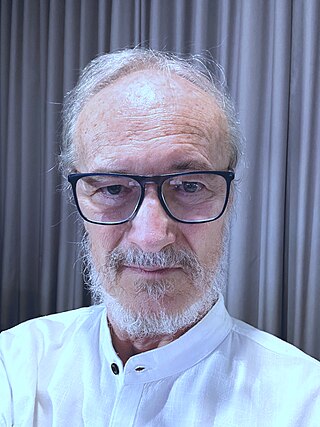Related Research Articles

Frank Schmalleger is an American criminologist, academic, and author. He is a Distinguished Professor Emeritus at the University of North Carolina at Pembroke.
Gary LaFree is a Professor and Chair of the Criminology and Criminal Justice department at the University of Maryland, College Park, the Director of the Maryland Crime Research and Innovation Center (MCRIC) and the Founding Director of the National Consortium for the Study of Terrorism and Responses to Terrorism (START). His main areas of expertise are sociology, criminology, race and crime, cross-national comparative research and political violence and terrorism.

Kurt Alder was a German chemist and Nobel laureate.
Michael D. Maltz is an American electrical engineer, criminologist and Emeritus Professor at University of Illinois at Chicago in criminal justice, and adjunct professor and researcher at Ohio State University.

The Institute of Criminology is the criminological research institute within the Faculty of Law at the University of Cambridge. The Institute is one of the oldest criminological research institutes in Europe, and has exerted a strong influence on the development of criminology. Its multidisciplinary teaching and research staff are recruited from the disciplines of law, psychiatry, psychology, and sociology. It is located on the Sidgwick Site in the west of Cambridge, England. The Institute of Criminology building was designed by Allies and Morrison. The Institute is also home to the Radzinowicz Library, which houses the most comprehensive criminology collection in the United Kingdom. The Institute has approximately 50 PhD students, 30-40 M.Phil. students, and 200 M.St students. The Institute also offers courses to Cambridge undergraduates, particularly in law, but also in human social and political sciences and in psychology and behavioural sciences.

Gustav Aschaffenburg was a German psychiatrist born in Zweibrücken.

Hilde Bruch was a German-born American psychiatrist and psychoanalyst, known foremost for her work on eating disorders and obesity.
The Journal of Criminal Law & Criminology ("JCLC") is a peer-reviewed, student-run academic journal published by the Northwestern University School of Law. Student editors select and edit articles submitted by professors, scholars, judges, practitioners, and students. The Journal publishes four issues per year, and hosts an annual Symposium focused on a select topic of criminal law.

Criminology is the interdisciplinary study of crime and deviant behaviour. Criminology is a multidisciplinary field in both the behavioural and social sciences, which draws primarily upon the research of sociologists, political scientists, economists, legal sociologists, psychologists, philosophers, psychiatrists, social workers, biologists, social anthropologists, scholars of law and jurisprudence, as well as the processes that define administration of justice and the criminal justice system.

Catherine Ann Warner is an Australian lawyer and legal academic who was the 28th Governor of Tasmania from 2014 to 2021.
Joan Ramme Petersilia was an American criminologist and the Adelbert H. Sweet Professor of Law at Stanford Law School, as well as the faculty co-director of the Stanford Criminal Justice Center.
Janet Lynn Lauritsen is an American criminologist and the Curators' Distinguished Professor Emerita of Criminology and Criminal Justice at the University of Missouri–St. Louis.
Hans Joachim Schneider was a German jurist, criminologist and psychologist. He taught as Professor of Criminology at the University of Münster.
Nancy Rodriguez is an American criminologist and professor in the School of Social Ecology at the University of California, Irvine.

Professor T. is a German TV crime-drama series set in Cologne about an eccentric professor at Cologne University, Jasper Thalheim, who is an advisor to the police. It is an adaptation from the Belgian TV series of the same name which has also a remake by the same name in France. There are four seasons with four episodes each, after which the series concluded. All episodes were aired on the German broadcasting channel ZDF.
Travis Cameron Pratt is an American criminologist and fellow at the University of Cincinnati Corrections Institute in Cincinnati, Ohio. He is the author of over 100 peer-reviewed papers on topics such as prison policy and theoretical criminology. He is particularly known for his research on private prisons.
Denise Claire Gottfredson is an American criminologist and professor in the department of criminal justice and criminology at the University of Maryland, College Park.

Betty Heimann was the first woman Indologist to habilitate in Germany. After the Nazis banned Jews from holding academic positions in Germany in 1933, she taught at the University of London and became a British citizen. After the end of World War II she founded the Department of Indian Philosophy and Sanskrit at the University of Ceylon.
Kerry Lyn Carrington is an Australian criminologist, and an adjunct professor at the School of Law and Society at the University of the Sunshine Coast (USC). She formerly served as head of the QUT School of Justice for 11 years from 2009 to 2021. She was editor-in-chief of the International Journal for Crime, Justice and Social Democracy. She is known for her work on gender and violence, feminist criminology, southern criminology, youth justice and girls' violence, and global justice and human rights.

Die Psychologie des Verbrechens - eine Kritik is a 1912 German book by Max Kauffmann (1871-1923). It deals with reasons for antisocial and criminal behavior. It explores the psychological aspects of criminal behavior and provides an analysis of the field of criminology at the time. The book delves into sociological aspects as well as juridical concepts such as "Gewaltenteilung", shedding light on their relevance to the understanding of criminal psychology. Kauffmann classifies criminals into vagrant and energetic types and subtypes, examining their characteristics. The causes of crime are explored, followed by discussions on penal law, crime prevention, and reforming punishment administration.
References
- ↑ Hans J., Hirsch (19 February 2018). Gedächtnisschrift Für Hilde Kaufmann. Walter de Gruyter GmbH & Co KG, 2018. ISBN 9783110906516.
- ↑ "Kiel professors from 1919 to 1965".